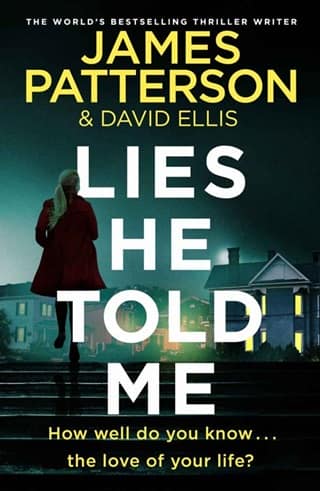NINETY-TWO
NINETY-TWO
I RUN STRAIGHT THROUGH the alley, due east, but turn north at the first street, so anyone looking down the alley from the bank won't see me. I zigzag through alleys and streets until I'm five or six blocks north and east from the bank, in a park.
The park is all but empty in the middle of the day on a weekday, with temperatures in the thirties or forties and the sky gray. I spot a gazebo not far away and make my way to it.
My heart pounding, chest burning, I collapse to the gazebo's floor, catching my breath and giving myself time to think.
I have no idea how close behind me they are. How much of a head start did I get? Are they a block away or three miles off in the wrong direction?
Where am I, and where do I go from here? I can't use my phone to call an Uber; if I turn it on, they'll track me.
Wait — David's phone, the burner he gave me. I pull it out and do a search. I find what I'm looking for — it's not too far away, eight-tenths of a mile.
Okay. It's now or never. I peek around me, looking for speeding vehicles or people running, listening for sirens. It's as good a time as any.
I can hardly run with these duffel bags. Should I abandon them? Something tells me I might need them. But they're too numerous, too clunky to run with.
I decide to leave them here. If I really need them, I'll come back for them. What are the odds, in the middle of a cold November day, that someone will take them off this gazebo?
Whatever. I have to move, and I have to move now.
I take off, a flat-out sprint when nobody's around and a controlled jog when a car approaches along the street or I pass a pedestrian. At least there aren't a lot of people out now. The fewer people who see me the better.
The downside: I'm far more exposed if someone looking for me happens along. But I'm committed to a hard run. There are no guarantees. My best bet is to get where I'm going as fast as possible.
I stop, bend over at the knees, and catch my breath. I can jog three miles easily, but an all-out sprint for half a mile has burned my fuel down to empty. I take desperate gasps of air, my chest heaving, my head woozy, nausea surging to my throat.
How do I get out of this? No brilliant plans, no get-out-of-jail-free cards spring to mind. Nothing that guarantees I'll live. No guarantees that David or I, should we manage to survive, will avoid prison.
Cars travel past me along this north-south street. I try to keep my face down as they pass. There's no good cover here. I'm out in the open.
Go, Marcie, go.
My chest burning, my legs like rubber, I motor on, spotting a major thoroughfare up ahead. Is that it? I run like I'm running for my life. I'm running for two young lives.
There. I reach it, a four-lane road, congested. I take violent, heaving breaths. The dizziness and nausea overcome me; I bend over and retch, having no food in my stomach to vomit. More deep breaths, one eye on the street, looking for gaps in traffic.
When one comes, I race across the street, feeling very exposed, then down two storefronts until I'm finally, miraculously, at my destination: J. T.'s Sportswear.
Never thought I'd be so happy to see a store that sells Big Ten sweatshirts.
I wipe sweat from my face and draw a few more deep breaths before I walk into the store, filled from wall to wall with clothing, mostly orange-and-blue apparel of all sorts. I grab a blue Fighting Illini sweatshirt and a matching blue hat. I throw in some sunglasses to boot. It isn't perfect, but even a little concealment helps.
"You doing okay there, ma'am?" asks the clerk, a young kid with a goatee and bad acne. I can only imagine how flushed and sweaty and disheveled I look.
"I'm having one of those days," I say.
"I feel that ."
Yeah, do ya, sport? Wanna trade places?
Something catches my eye in a display near the register — a Fighting Illini Swiss Army knife. "I'll take this, too," I say.
While inside the store, I do a search on David's phone for my next stop, confirming that it's only three blocks away. Okay. Let's go .
In the parking lot, I pull the sweatshirt over my head, don the cap and sunglasses, and slip the knife into my pocket. I start down the street for my next destination. Again, I feel exposed, walking on the sidewalk along a busy thoroughfare, but at least I've changed my look. I hold my cell phone to my ear, even though I'm not using it — it's not even powered on — as an excuse to lower my head as if in concentration.
I reach my destination a few minutes later. The lobby inside is empty. A man in a yellow shirt is smiling at me as I enter.
"Hi," I say. "I need to rent a car."
While they process my information, I step out and call Camille on David's phone. She doesn't answer at first — unrecognizable number — but picks up the second time I call.
"Camille, it's Marcie," I say. "Take the kids and run."
 Fullepub
Fullepub 



